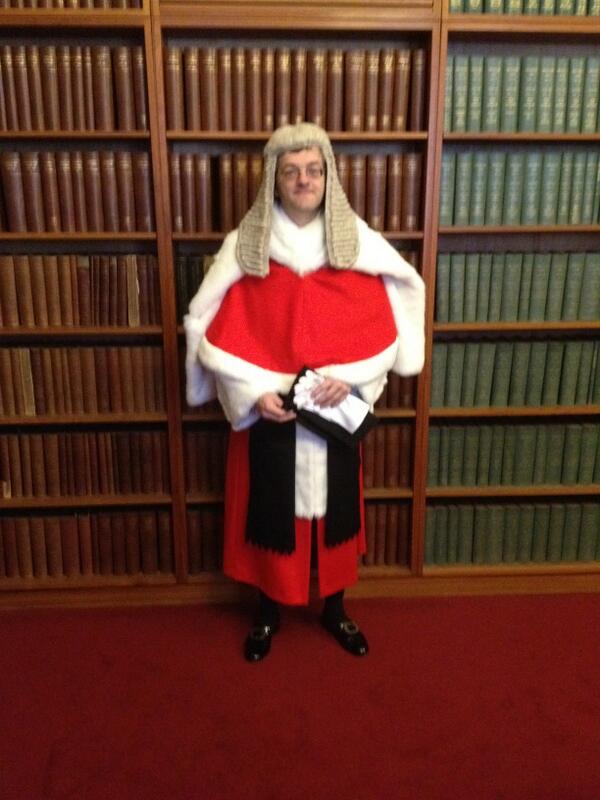High Court Rules Government Acted 'Unlawfully' In Universal Credit Case
Thursday 14 June, 2018 Written by Daily Record
The Government acted 'unlawfully' in denying two men a 'top up' on their Universal Credit claim to account for their severe disability.
A judge in London, who was told during a hearing in May that the men have been left unable to meet many of their basic needs, handed down his judgement this morning.
Mr Justice Lewis dismissed two of the claims brought in the case, which argued the benefits system broke the Equality Act, and that some parts of the 2013 Universal Credit regulations were discriminatory.
But in a third claim - that denying the men a 'top up' of their benefits to take account of the severity of their disabilities was discriminatory - the judge found in their favour.

Image: Judge Mr Justice Lewis
The Department for Work and Pensions say they will appeal the ruling.
Mr Justice Lewis heard from their barrister that a "significant" drop in monthly income was having "seriously detrimental impacts on their health and well-being".
Zoe Leventhal said that both men, who live alone without a carer, "are no longer able to meet many of their basic needs".
They had lost around £178 per month after having to move to the Universal Credit system - which replaced a range of means-tested welfare benefits with one single benefit.
The two men whose cases are at the centre of the judicial review action against the Work and Pensions Secretary cannot be named for legal reasons and are referred to as TP and AR.
TP is a 52-year-old terminally ill man who worked in the financial sector, while AR is aged 36 and suffers from severe mental health issues.
Their case is said to be the first legal challenge against the Universal Credit scheme.
Today the judge found in the Claimants’ favour on one of the three grounds, noting in the judgment: “The impact on the individuals is clear. They were in receipt of certain cash payments (the basic allowance and SDP and EDP).
"They are now in receipt of cash payments which, overall, are significantly lower than the amount previously received.
"They are a potentially vulnerable group of persons as the Government in its own material recognises.
"On the material before me, there appears to have been no consideration of the desirability or justification for requiring the individual to assume the entirety of the difference between income related benefits under the former system and universal credit when their housing circumstances change and it is an appropriate moment to transfer them to universal credit.
"That is all the more striking given the Government’s own statements over a number of years that such persons may need assistance and that there was a need to define with precision the circumstances in which they would not receive such assistance.
"In all the circumstances of this case, the operation of the implementation arrangements in the way they do is manifestly without reasonable foundation and fails to strike a fair balance”.
The judge concluded: “The implementing arrangements do at present give rise to unlawful discrimination contrary to Article 14 ECHR read with Article 1 of the First Protocol to the ECHR….A declaration will be granted that there is unlawful discrimination. The defendant will then be able to determine how to rectify the unlawful discrimination.”
Commenting on the case, Tessa Gregory a partner at Leigh Day, who represented both claimants, said: “This is the first legal test of the roll out of Universal Credit and the system has been found to be unlawfully discriminating against some of society’s most vulnerable.
“Whilst we welcome the Government’s commitment to ensuring that no one in our client’s position will now be moved onto Universal Credit until top up payments are in place, it comes too late as it cannot make up for the months of suffering and grinding poverty our clients and many others like them have already had to endure.
“We call upon Esther McVey to compensate our clients and all those affected without any further delay, and urge her to focus on fixing Universal Credit rather than wasting more public funds appealing this court decision.
“Today’s decision shows again that Universal Credit is not delivering what was promised at the outset. It is not working. It’s not working for the disabled, it’s not working for parents, it’s not working for low-income and part-time employees and it’s not working for the self-employed.
“The government needs to halt the rollout and completely overhaul the system to meet peoples’ needs, not condemn them to destitution. If this doesn’t happen further legal challenges will inevitably follow.”
TP, the first Claimant said: “In my 51st year my life was completely and suddenly thrown upside down with the diagnosis of a life changing end stage non-Hodgkin Lymphoma cancer. Having had a successful career I became reliant on financial support from the welfare system.
"To add to the stress of being seriously ill and undergoing very arduous treatments that have left me unable to work, I have had to take time off convalescing to fight in the Courts for subsistence level benefits.

Image: Her Majesty's Principal Secretary of State for Work and Pensions, The Rt Hon Esther McVey.
"In being compelled to migrate to Universal Credit where I lost the Severe Disability Premium I was deprived of a key mainstay of support for a disabled person living alone with no carer. The financial strain from the cutting of the SDP has made it so much harder for me to cope as it has been an additional daily stress. It has been detrimental to my health.”
“I always believed that I had been treated unfairly and in a discriminatory manner by the DWP, having lost out in this move into Universal Credit. I am delighted that the Courts have concurred that I have been unlawfully discriminated against.
"I feel vindicated in bringing this important Judicial Review of the DWP’s stance towards me, which also affects numerous others of the most vulnerable people in our society. I am pleased to have been able to have brought this case to the public’s attention, which casts a dark shadow on the fairness of the Universal Credit system.”
AR, the second claimant added: “I know a lot of people have been awaiting the outcome of this hearing as so many people have been badly affected by the roll out of Universal Credit. I know it is a time of austerity, but I do not understand why the Government are trying to penny-pinch with what is a relatively small and very vulnerable group, namely, severely disabled people without a carer.
"I thought we lived in a society where as a vulnerable group we would be protected not unlawfully discriminated against.”
A Department for Work and Pensions spokeswoman said: “This Government is committed to ensuring a strong system of support is in place for vulnerable people who are unable to work.
"Last week, the Secretary of State announced that we will be providing greater support for severely disabled people as they move onto Universal Credit. And we have gone even further, by providing an additional payment to those who have already moved onto the benefit.”
ABC Note: Esther McVey was appointed Secretary of State for Work and Pensions on 8 January 2018. She was Treasurer of HM Household (Deputy Chief Whip) from November 2017 to January 2018. She was Minister of State for Employment from 2013 to 2015. She was elected Conservative MP for Tatton in June 2017 and was a Conservative MP for Wirral West from 2010 to 2015.
Education
Esther graduated in law before becoming a graduate trainee with the BBC in 1991. She returned to Liverpool John Moore’s university in 2008 to do an MSc in corporate governance.
Political career
Esther was the first MP to employ an apprentice and got the House of Commons authorities to introduce the scheme.
Career outside politics
After leaving the BBC, Esther worked as a broadcaster and a journalist, presenting and producing programmes such as GMTV, a legal series for Channel 4, a BBC consumer show and a BBC science show.
In 2000, she established her own business setting up office space for new start-up companies as well as establishing the biggest business women’s network in the north west.
She has written a careers book “If Chloe can”, which was turned into a play and performed at the National Youth Theatre.
Personal life
Esther is passionate about issues such as careers, youth unemployment, apprenticeships, investment and business growth.
ABC Note: You can Comment below

Leave a comment
Make sure you enter all the required information, indicated by an asterisk (*). HTML code is not allowed.
Join
FREE
Here










